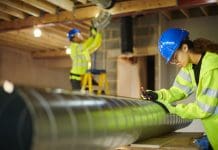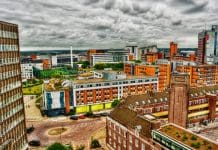In this article, Willmott Dixon Interiors explains how the company is meeting sustainability targets and creating a greener community through their ‘industry leading’ Now or Never sustainability strategy
In 2020, Willmott Dixon announced its intention to plant 100,000 trees in the UK by the end of the decade. The plans form part of Now or Never, Our decisive decade, an industry-leading sustainability strategy with ambitious targets.
Willmott Dixon’s national fit-out and refurbishment specialist contractor, Willmott Dixon Interiors has recently completed the first phase of its contribution to meeting those targets.
It has planted more than 2,600 trees at locations close to its construction sites in Leeds, London and the West Midlands, thanks to an innovative partnership with a leading nature charity.
in this article, Hayley Newman, sustainability manager at Willmott Dixon Interiors, explains how they’ve done it and what they plan to do next.
Helping to build a better planet
Willmott Dixon’s Now or Never strategy sets clear and stretching ambitions and targets for its business, focused on three key themes: Brilliant Buildings, Building Lives and Better Planet.
The latter is all about putting the climate, biodiversity, and resource crises at the heart of the way it does business, leaving a better world for future generations.
“As a business we’ve been carbon neutral since 2012 and are committed to becoming a zero-carbon company without offsetting by 2030,” says Hayley Newman.
“We’ve also eliminated all single-use plastic from our offices and banned diesel on our sites where fuel is unavoidable.
“Better Planet sets out wider ambitions and that includes delivering enhancements to nature through projects that improve environmental services such as habitats for biodiversity, flood defence and wellbeing. Put simply, it means leaving the environment in a measurably better state than before, helping to create happier and healthier communities in the process.”
Connecting people with nature
Trees are one of the world’s biggest tools in combating climate change and have been a stabilising factor on our planet for millennia.
It is no surprise that a large-scale tree planting campaign was identified as a way of contributing to the delivery of the Better Planet strand of Now or Never.
Yet planting the most appropriate species in the right location isn’t entirely straightforward, which is why Willmott Dixon Interiors teamed up with The Conservation Volunteers (TCVs).
Hayley explains: “We conducted a lot of research into potential partner organisations as we wanted the project to be localised and relevant to the communities in which we work.
“Choosing TCV has allowed us to tap into more than 60 years’ of conservation experience in connecting people with nature. What really captured our imagination was its concept of blending traditional and Miyawaki-style planting. It’s something different and exciting, and we thought its benefits would appeal to our stakeholders.”
Mighty oaks from mini forests grow
A dense patch of fast-growing shrubs, trees, or canopies, a Miyawaki-style ‘mini forest’ is about the size of a tennis pitch – perfect for introducing vibrant pockets of nature into urban areas.
Using the Miyawaki method, Willmott Dixon Interiors planted a mini forest in Mansfield Park, a residential area of the London Borough of Waltham Forest.
It’s located less than four miles from the site of the Grade II* former Granada/EMD Cinema, where Willmott Dixon Interiors is delivering a restoration project on behalf of Waltham Forest Council.
More than 25 volunteers spent two days planting 642 trees at Mansfield Park, with support from the council and sponsorship from several of its supply chain partners.
“We’ve created a thriving ecosystem in a tiny space,” adds Hayley.
“It’s a multi-layered woodland including oak, beech, hazel, hornbeam, willow, wild cherry and spindleberry, which will provide food sources for a wider range of species.
“Some studies suggest that mini forests can boost biodiversity by up to 20 times more than traditional planting and that’s really important to us – this isn’t a tick box exercise, it’s all about the impact we can make.”
Strengthening relationships
Other projects delivered by the contractor’s partnership with TCV include a woodland restoration initiative at Lickey Hills Country Park in Birmingham and tree planting at Pendeford Mill Nature Reserve, just a few miles from where Willmott Dixon Interiors is completing the refurbishment of Wolverhampton’s Civic Halls.
More than 600 trees were also planted on land owned by the local authority in Bramley, Leeds, increasing the urban canopy cover in the city and supporting the local council’s own ambitious plans to help combat the climate emergency.
Planting in multiple locations has enabled maximum engagement and delivered much more than carbon related benefits.
Employees from Willmott Dixon Interiors have been given the opportunity to volunteer and meet new people, while relationships have been strengthened with various local authorities, supply chain partners, communities and customers.
In total the project has delivered:
- 2,642 trees planted
- 18 different native species
- 56 volunteers attended across five separate events
- 335 volunteer hours recorded
- Four customers directly engaged
- 15 supply chain partners and consultants engaged
Willmott Dixon Interiors’ partnership with TCV doesn’t end here.
Arrangements have been put in place for the ongoing maintenance of each tree planting project, ensuring that they will continue to flourish for years to come.
Hayley says: “We were really clear at the outset that we wanted every project to have lasting outcomes for the environment and our communities.
“All of the sites we chose are linked to organisations that work locally and we’re arranging specific dates for their maintenance. It means that we can not only create green spaces for people and nature but contribute to a long-term improvement in people’s health and wellbeing too.”
Buoyed by the experience, Willmott Dixon Interiors is planning a follow-up tree planting project and is currently delivering a separate biodiversity scheme at a construction site in Portslade, Brighton. It also has plans to develop a rehabilitation garden for stroke patients as part of a refurbishment project in Epsom, which will include sensory areas and special pathways.
“We’ve started on a fairly small scale but the experience has given us valuable information and so many new ideas about how we can further enhance green spaces for our customers and their communities,” adds Hayley.
“We’re looking forward to continuing the development of our approach and applying what we’ve learnt to our next tree planting season which starts in November.”









![[VIDEO] Making DorTrak reports easy to read with Fireco Inspecting fire doors at Fireco, firedoor technology, 2023](https://www.pbctoday.co.uk/news/wp-content/uploads/2024/04/JPZ_2364-web-218x150.jpg)
![[VIDEO] Re-flow Field Management review by Traffic Management Installations When TMI began subcontracting for councils and government bodies, they wanted to present their site reporting in a more professional manner](https://www.pbctoday.co.uk/news/wp-content/uploads/2025/03/TMI-Media-1-218x150.png)



